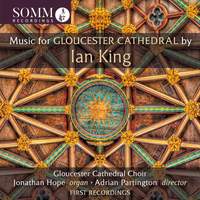Interview,
Choral music by Ian King from Gloucester Cathedral
 Most classical music-lovers could be forgiven for not being immediately familiar with the name Ian King – except perhaps those with a parallel affinity for folk music, to whom he might be a little better-known as part of the husband-and-wife core of four-piece folk band Kings and Folk, who were active until the mid-2010s.
Most classical music-lovers could be forgiven for not being immediately familiar with the name Ian King – except perhaps those with a parallel affinity for folk music, to whom he might be a little better-known as part of the husband-and-wife core of four-piece folk band Kings and Folk, who were active until the mid-2010s.
So why is the latest release of his music being performed not by a comparable chamber-folk combo, but by the choirs of Gloucester Cathedral? As Gloucester's Director of Music Adrian Partington explains, it's not as strange as it might seem. Ian's relationship with church music, and with the cathedral itself, goes back a long way; this album devoted completely to his sacred choral works, all of them written specially for Gloucester Cathedral, in many ways brings his music full circle back to its classical origins, enriched by a long and eclectic lifetime of music-making in other genres.
Where did the idea first come from to record this album devoted to Ian King’s music?
Knowing that Ian was very ill, I decided that I wanted to make a permanent record in sound of his compositions for Gloucester Cathedral, while he was still alive, so that he could oversee the interpretation of the music. His ideas about his music, and his opinions about how it should be performed permeate the recording, and thus we have performances that are authentic. Only composers really know how they wish their own music to be performed. For instance, no conductor has ever come close to Elgar in the interpretation of his works. Elgar’s own recordings of his own music make it live in a way that no-one else can. I wish we had recordings of Bach directing his own music!
A whole album of music written by the same person for the same institution is fairly unusual; how did Ian’s close relationship with Gloucester Cathedral arise, and what made it so special?
I knew Ian slightly through our shared interest in a totally different aspect of life, homoeopathy; but I only met him once, at a funeral, before he sent me a composition of his. I get sent dozens of compositions each year to peruse – and I do look at everything that comes my way – but sadly, I am unable to perform much of this music. However, this piece of Ian’s jumped off the page at me; I recognized a new voice immediately. When some money became available – through the generosity of Canon Heavisides at Gloucester Cathedral – I decided to commission Ian to write a St John Passion to be performed in the cathedral on Good Fridays. This work is a minor masterpiece, and quite unlike anything else in the repertoire.
Shortly after the first performance of this work, Ian’s health took a turn for the worse, and he started to compose more and more almost as an act of defiance against his increasing illness, but also as a vehicle for his spiritual development and creative needs. Hence the stream of wonderful compositions he produced for us as his health deteriorated. We became firm friends during these years; and I was pleased to be able to give him a sense of artistic purpose whilst he dealt with his acute physical sufferings. But I was merely an adjunct to his late-flowering gifts; his real stimulus was his love for Gloucester Cathedral, and specifically its acoustic, which is one of the most beautiful in the country.
Ian died shortly before this album was released, turning it into a posthumous tribute in addition to being a celebration of his work. How much was he involved in the earlier stages of planning and putting together the recording?
Ian was able to oversee many aspects of the CD. The choice of music was his; the order of the pieces on the disc; aspects of the interpretation were his, such as which voices should sing which passages, and so on.
As a self-taught composer – and one with a long career on the folk scene – King might be expected to be more eclectic than most in the factors he draws on to form his own style. Who do you hear as the main influences on him?
Ian’s music is definitely eclectic! I hear folk song in it, of course, such as the solo at the start of the Nunc Dimittis and The Christmas Truce, also jazz and Afro-American spirituals; and I hear much from the minimalist school, plus aspects of Howells and Vaughan Williams. But above all, I hear the music of someone who passionately loved the liturgical language of the Anglican Church, and was determined to set it carefully and meaningfully.
This album is predominantly devoted to relatively small-scale works – suitable for service use rather than concert performance. Are there other choral works by King on the scale of the St John Passion included here?
Had Ian lived, he would have produced more large works; in his later years, he didn’t want to start anything big, because he feared that he wouldn’t live to finish it. As it happened, he lived five years longer than his doctors said he would; but he feared that he wouldn’t have time to complete anything larger than a Magnificat. The Christmas Truce is the longest late piece he wrote at about twelve minutes.
You’ve said that you believe King to be destined for a place in the pantheon of acclaimed and beloved Anglican composers – which requires his music to be adopted beyond just Gloucester Cathedral. Which of his pieces would you particularly recommend to a choir interested in trying him out?
I would recommend that a conductor coming new to Ian’s works should try one of the simpler collects, probably We beseech thee. I would also recommend the Jubilate for children’s voices; and, for cathedral choirs, the Gloucester Service, which I am pleased to say Hereford and Worcester Cathedral Choirs have already performed.
Gloucester Cathedral Choir, Jonathan Hope (organ), Adrian Partington
Available Formats: CD, MP3, FLAC, Hi-Res FLAC



